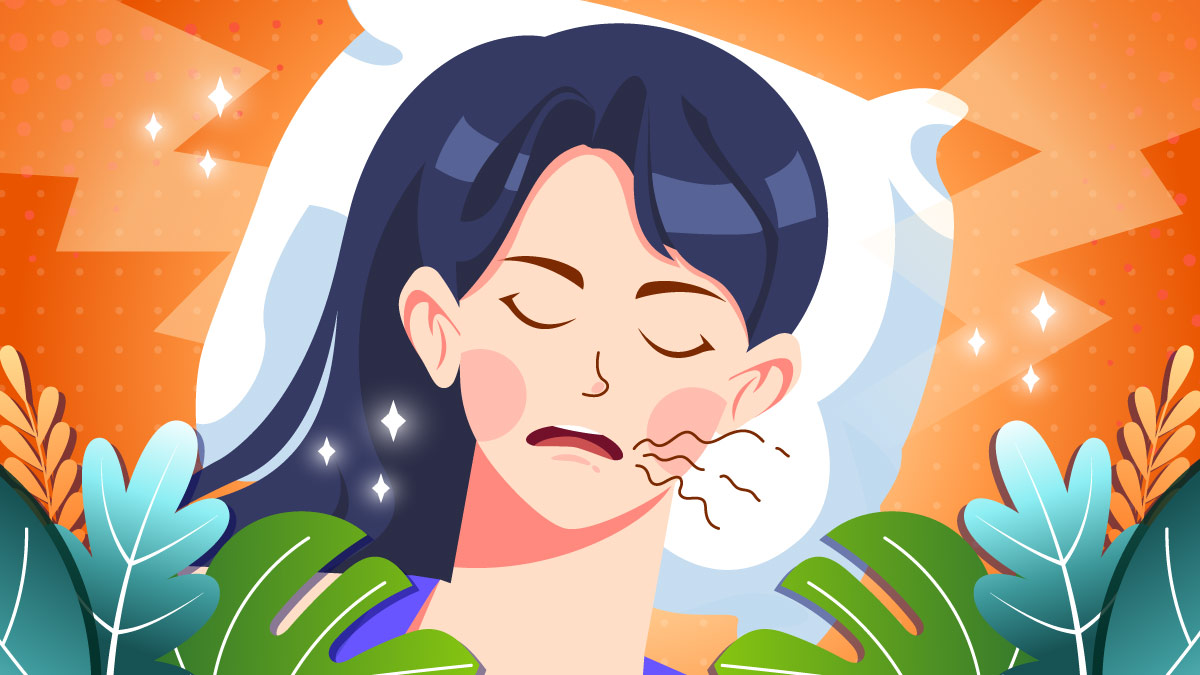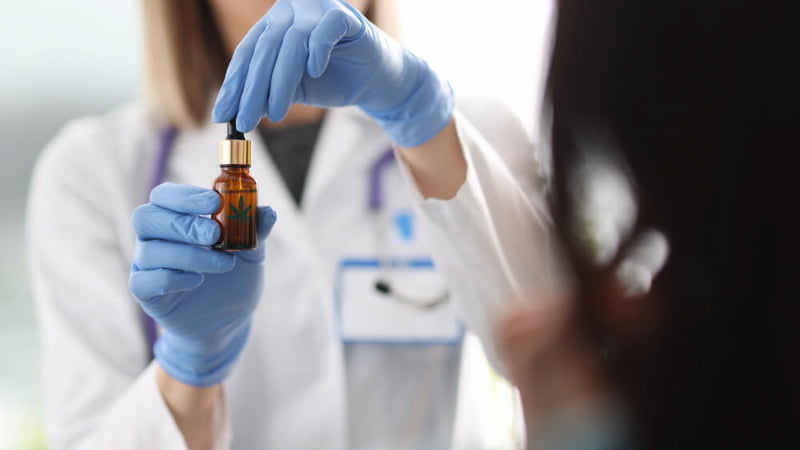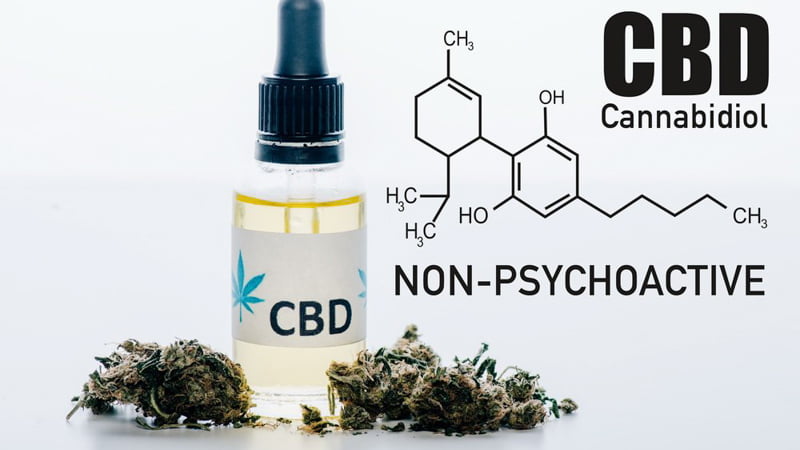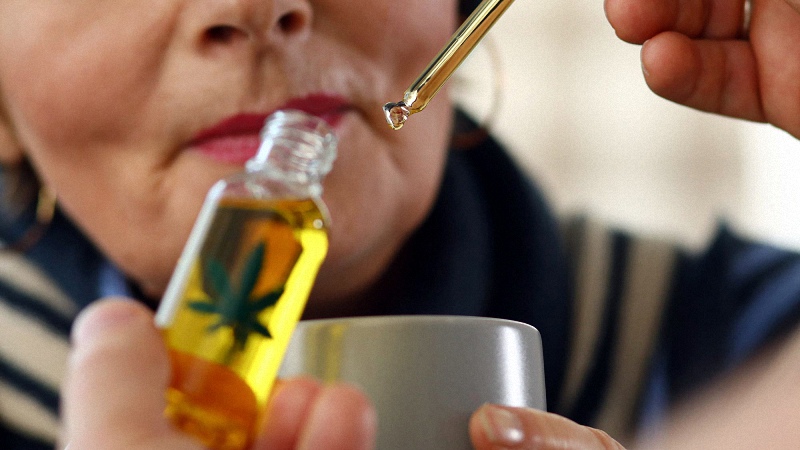CBD Oil for Sleep Apnea: How Can It Help?

Sleep apnea refers to a group of breathing disorders such as problems with snoring, headaches, difficulty staying asleep, and lethargy in the daytime.
Although CBD isn’t an established treatment for sleep apnea, many people are using CBD oils and other products to improve their quality of sleep and control the symptoms of sleep apnea.
CBD is the major cannabinoid in hemp plants; it modulates the activity of the endocannabinoid system (ECS), which is the master regulatory network in the body. By interacting with the ECS, CBD can act on several essential functions, including pain, mood, memory, fertility, immune response, appetite, sleep, and more.
Today, we explain how using CBD may help you alleviate the symptoms of sleep apnea — and how to use it to get the most out of your supplementation.
But first, let’s take a closer look at sleep apnea.
What Is Sleep Apnea?
As reported by Mayo Clinic, sleep apnea is a sleeping disorder manifesting as problems with breathing that repeatedly starts and stops.
Sleep apnea can be broken down into three main types, including:
- Central sleep apnea (CSA) – this type of sleep apnea occurs when the brain fails to communicate properly with the muscles responsible for breathing.
- Obstructive sleep apnea (OSA) – is the most common sleep apnea disorder. It occurs upon the relaxation of the throat muscles.
- Complex sleep apnea syndrome – this disorder can be triggered by both types of sleep apnea and is often called treatment-emergent central sleep apnea.
The two common underlying causes of sleep apnea are a person’s physical structure or comorbid conditions, such as:
- Endocrine disorders
- Genetic syndromes
- Heart or kidney failure
- Neuromuscular disorders
- Obesity
- Premature birth
Symptoms of Sleep Apnea
The symptom of apnea include:
- Difficulty focusing
- Decreased sexual drive
- Loud and frequent snoring
- Irritability
- Insomnia
- Unrefreshing sleep
- Morning headaches
- Gasping sounds
- Choking
- Silent pauses when breathing
- Memory loss
- Nocturia (waking up to head to the bathroom at night.
The risk factors for sleep apnea include the following:
- Hypertensive patients
- Males
- Middle-age people
- Overweight or obese individuals
- People with large neck sizes
- Individuals with a family history of sleep apnea
Untreated sleep apnea can cause daytime fatigue, cardiovascular problems, metabolic syndrome, type 2 diabetes, and co-deprivation of sleep on the partner’s side (due to loud snoring).
Does CBD Oil Help with Sleep Apnea?

In a study published in the journal Current Neuropharmacology, the authors found that CBD might be the modulator of the sleep-wake cycle.
The National Sleep Foundation states that the sleep-wake cycle, also known as the body clock or circadian rhythm, is the body’s internal system that controls feelings of wakefulness and sleepiness over 24 hours.
A study from the journal Sleep indicates that the circadian system plays an important role in the development of sleep apnea. The research team also suggested that this system could be the therapeutic target in the treatment of sleep apnea.
In 2016, a study was published in the journal Endocrine Reviews, stating that the circadian system influences the body’s sleep-wake cycle. The authors also added that sleep duration is affected by the circadian phase at which sleep occurs.
Research has concluded that the endocannabinoid system (ECS) helps regulate the sleep-wake cycle — suggesting that the lack of restorative sleep could lead to dysregulation within the ECS.
The authors also noted that the ECS becomes engaged in the recovery of sleep after a person suffers from abnormal sleep periods.
Why Are People Turning to CBD for Sleep Apnea
As mentioned earlier, there are no direct studies on the effects of CBD on sleep apnea. That being said, research shows that CBD might be a promising therapeutic agent for this condition — and for the management of its symptoms.
Here’s why people are using CBD for sleep apnea instead of conventional medications.
CBD for Sleep
People with sleep apnea often experience trouble sleeping (insomnia) or go through excessive daytime sleepiness as a result of the imbalance in their circadian rhythm.
In 2017, researchers published a study in the journal Current Psychiatry Reports, highlighting CBD as the potential treatment for insomnia depending on the CBD dose. High doses of CBD had a sleep-inducing effect, while low CBD doses stimulated daily awareness.
Another study found that patients with insomnia who took a high dose of 160 mg of CBD reported increased total sleep time.
The Journal of Clinical Psychopharmacology has also found that low doses of CBD were linked with increased alertness in four males and four females who received 15 mg of CBD.
In a case study published in The Permanente Journal, the researchers have shown that CBD oil administration improved the quality and quantity of the test subject’s sleep. The patient also reported reduced anxiety.
Another study from the Journal of Psychopharmacology found that rats who were given CBD exhibited increased sleep time overall.
CBD can also help with snoring. Although there are no studies that would examine CBD’s efficacy in this condition, there are studies on its potential effects on the conditions that cause snoring.
A study published in The American Review of Respiratory Disease concluded that heavy snorers experience more intense snoring during slow-wave rapid eye movement (REM) sleep.
A research paper from the journal FEBS Letters found that CBD might reduce REM sleep. This animal-based study also found that CBD might increase daytime wakefulness.
However, the authors didn’t draw a clear line between CBD, sleep apnea, and snoring.
CBD for Blood Pressure
Sleep apnea patients are prone to developing high blood pressure also known as hypertension.
A 2017 study released in the journal JCI Insight showed that a single dose of CBD reduced blood pressure in healthy participants.
9 males took a dose of 600 mg of pure CBD. The research team suggested that CBD may affect cardiovascular disorders. They have yet to study these properties in sleep apnea patients who have hypertension.
A 2017 review of the existing studies on CBD’s effects on the dynamics of blood flow found that CBD might be useful for treating several cardiovascular disorders, including myocardial infarction, hypertension, and strokes.
CBD for Anxiety and Depression
A 2019 study reported that the frequency of anxiety and depression was higher in patients with sleep apnea than in most individuals.
The Permanente Journal published a research paper revealing that CBD had a calming and balancing effect on the central nervous system. 22 adult subjects with anxiety and sleep disorders reported that their conditions improved after taking CBD.
In a 2019 study posted in the journal Frontiers in Psychology, the authors stated that CBD might curb anxiety-like behaviors. The study tested 37 patients with social anxiety; all subjects reported that their anxiety significantly dropped after a dose of 300 mg of CBD oil.
Other studies have brought similar results, suggesting that CBD had anxiolytic and antidepressant properties.
CBD for Headaches
Sleep apnea patients regularly suffer from headaches. They are typically woken up by these headaches resulting in the person feeling unrefreshed even after a full night’s sleep.
Headaches involve mild to moderate pain, typically in the neck or at one side of the head.
A 2020 study from the journal Frontiers in Pharmacology pointed to CBD as a promising treatment for chronic pain and headaches.
In another study — conducted in 2018 — researchers tested 7 kidney transplant patients. The subjects first took 100 mg of CBD twice a day for 3 weeks. The dosage was steadily increased by 150 mg throughout the study’s duration.
Two patients reported total pain relief, while four experienced a partial response in the first two weeks. Meanwhile, one patient reported no signs of relief.
The authors of the study concluded that CBD could be a safe and well-tolerated treatment for headaches.
In 2020, the journal Current Pharmaceutical Biotechnology released a study that found a CBD topical formulation to be effective for symptomatic relief of peripheral neuropathy of the lower body parts.
The study involved 29 patients with peripheral neuropathy. They reported that the topical formulation reduced severe pain, cold, and itchiness in the problematic spots.
CBD for Diabetes
Sleep apnea was linked to type 2 diabetes in a 2016 study. Type 2 diabetes is a condition occurring when a person’s blood sugar is too high and the body can’t use it for energy — it’s the most common type of diabetes.
In a study published in the Journal of the American College of Cardiology, the researchers noted that CBD has positive effects on diabetes. The study highlighted the antioxidant, neuroprotective, and anti-inflammatory properties of CBD.
A combination of CBD and THCV (tetrahydrocannabivarin) helped reduce blood glucose levels and increase insulin production in type 2 diabetes patients in a study published in 2016 by the journal Diabetes Care.
Why Use CBD Oil for Sleep Apnea?

- CBD has demonstrated potential benefits for the symptoms of sleep apnea in animal and human studies, as well as in clinical trials despite not being an established treatment.
- CBD has a great safety profile. You can use it without the risk of dangerous side effects, lethal overdose, or addiction.
- CBD is legal in all 50 states and can be purchased over the counter. You don’t need a prescription for hemp-derived CBD products.
- CBD can influence our circadian system, which is a potential therapeutic target for sleep apnea.
The Limitations of Using CBD for Sleep Apnea
- There are no direct studies that would investigate CBD’s efficacy for sleep apnea.
- CBD still has a few mild side effects, such as tiredness, diarrhea, and changes in appetite.
- The FDA hasn’t approved the use of CBD for treating medical conditions other than epilepsy. Therefore, there are no standard dosage guidelines or regulations surrounding the quality of CBD products.
- The above situation creates room for mislabeled products. According to different studies, 26% of tested samples contained less CBD than advertised, and 21% had THC amounts that were large enough to get children high.
How to Choose the Right CBD Oil for Sleep Apnea?
People generally prefer the full-spectrum type of CBD for sleep apnea. This type uses all the ingredients occurring in the Cannabis sativa plant, such as CBD, adjunctive cannabinoids, terpenes, flavonoids, fatty acids, essential oils, and traces of THC.
All these compounds work together in synergy to boost the therapeutic effects of the plant. Scientists call this mechanism the entourage effect.
If for some reason, you don’t want to take any THC in your CBD oil, you can opt for a broad-spectrum version of CBD, which comes with the same range of phytonutrients, save for THC.
People who are allergic to certain hemp compounds turn to CBD isolates. This is the purest version of CBD; it has no odor and flavor and provides the highest dose of CBD per serving.
Unfortunately, isolate-based CBD oils don’t leverage the concept of the entourage effect, which makes them a less desired option among users.
You should also check your vendor’s reputation, the source of CBD, extraction method, and third-party testing before buying any CBD product for sleep apnea.
CBD Dosage for Sleep Apnea
Due to the lack of FDA guidelines, CBD has no standard dosage recommendations. If you want to figure out the best CBD dosage for you, then you should increase the amount of CBD oil intake gradually. Patients with sleep apnea are encouraged to start with a low amount and gradually work their way up to the dosage when they reap the most benefits without adverse reactions.
As mentioned before, high doses of CBD might act as sedatives, while low doses might promote alertness.
It’s a good idea to write down how you feel after each dose of CBD so that you can monitor the effects and adjust the dosage accordingly.
If you have sleep apnea and are considering adding CBD to your daily routine, it’s best to consult a doctor. Properly treated sleep apnea by a qualified professional is important to protect you against long-term complications.
How to Take CBD Oil for Sleep Apnea?

There are several forms of CBD you may take that are available on the market that you can use for sleep apnea. However, some CBD types may be more effective than others.
CBD oils are the most common format. They are taken under the tongue for improved absorption. Patients can place the oil using a dropper attached to the bottle and hold it beneath the tongue for about 60 seconds before swallowing.
There are also CBD vape pens available in the market today that offer higher bioavailability than oils; they also have a faster onset, but on the other hand, their effects are shorter-lived.
CBD also comes in oral formats, such as capsules and edibles. These products provide a fixed dose of CBD per serving, so there is no guesswork involved — you just eat your favorite CBD-infused gummies or take as many CBD capsules to help you sleep as recommended by your doctor, or as stated on the jar.
Finally, there are CBD topical formulations that you can use as a means of localized relief from pain, irritation, redness, swelling, and other kinds of physical discomfort.
Key Takeaways on Using CBD Oil for Sleep Apnea
CBD has demonstrated several health benefits for patients with sleep apnea. Both animal and human studies suggest that this cannabinoid can be used for symptom control and to improve sleep quality in people suffering from this condition.
On top of that, CBD might be useful in regulating a person’s sleep-wake cycle — one of the main therapeutic targets for sleep apnea.
More research needs to be done on the link between CBD and sleep apnea, but current findings are very promising.
You can incorporate CBD oil into your daily routine to reduce anxiety, hypertension, pain, and type 2 diabetes, all of which are the side effects of untreated sleep apnea.
CBD may be used safely as adjunctive therapy to some conventional sleep apnea treatments, such as lifestyle changes, physical activity, CPAP machine use, and diet modifications.
Do you take CBD oil for sleep apnea? Does it help? Let us know by leaving a comment below:
References:
- Murillo-Rodríguez, E., Sarro-Ramírez, A., Sánchez, D., Mijangos-Moreno, S., Tejeda-Padrón, A., Poot-Aké, A., Guzmán, K., Pacheco-Pantoja, E., & Arias-Carrión, O. (2014). Potential effects of cannabidiol as a wake-promoting agent. Current neuropharmacology, 12(3), 269–272.
- Butler, M. P., Smales, C., Wu, H., Hussain, M. V., Mohamed, Y. A., Morimoto, M., & Shea, S. A. (2015). The Circadian System Contributes to Apnea Lengthening across the Night in Obstructive Sleep Apnea. Sleep, 38(11), 1793–1801. (2)
- Morris, C. J., Aeschbach, D., & Scheer, F. A. (2012). The circadian system, sleep, and endocrinology. Molecular and cellular endocrinology, 349(1), 91–104.
- Babson, K. A., Sottile, J., & Morabito, D. (2017). Cannabis, Cannabinoids, and Sleep: a Review of the Literature. Current psychiatry reports, 19(4), 23. (4)
- Shannon, S., Lewis, N., Lee, H., & Hughes, S. (2019). Cannabidiol in Anxiety and Sleep: A Large Case Series. The Permanente journal, 23, 18–041.
- Chagas, M. H., Crippa, J. A., Zuardi, A. W., Hallak, J. E., Machado-de-Sousa, J. P., Hirotsu, C., Maia, L., Tufik, S., & Andersen, M. L. (2013). Effects of acute systemic administration of cannabidiol on sleep-wake cycle in rats. Journal of psychopharmacology (Oxford, England), 27(3), 312–316.
- Shannon, S., & Opila-Lehman, J. (2016). Effectiveness of Cannabidiol Oil for Pediatric Anxiety and Insomnia as Part of Posttraumatic Stress Disorder: A Case Report. The Permanente journal, 20(4), 16-005.
- Monti J. M. (1977). Hypnoticlike effects of cannabidiol in the rat. Psychopharmacology, 55(3), 263–265.
- Shahveisi, K., Jalali, A., Moloudi, M. R., Moradi, S., Maroufi, A., & Khazaie, H. (2018). Sleep Architecture in Patients With Primary Snoring and Obstructive Sleep Apnea. Basic and clinical neuroscience, 9(2), 147–156. (9)
- Murillo-Rodríguez, E., Millán-Aldaco, D., Palomero-Rivero, M., Mechoulam, R., & Drucker-Colín, R. (2006). Cannabidiol, a constituent of Cannabis sativa, modulates sleep in rats. FEBS letters, 580(18), 4337–4345.
- Jadoon, K. A., Tan, G. D., & O’Sullivan, S. E. (2017). A single dose of cannabidiol reduces blood pressure in healthy volunteers in a randomized crossover study. JCI insight, 2(12), e93760.
- Sultan, S. R., Millar, S. A., England, T. J., & O’Sullivan, S. E. (2017). A Systematic Review and Meta-Analysis of the Haemodynamic Effects of Cannabidiol. Frontiers in pharmacology, 8, 81.
- Kim, J. Y., Ko, I., & Kim, D. K. (2019). Association of Obstructive Sleep Apnea With the Risk of Affective Disorders. JAMA otolaryngology– head & neck surgery, 145(11), 1020–1026.
- Shannon, S., Lewis, N., Lee, H., & Hughes, S. (2019). Cannabidiol in Anxiety and Sleep: A Large Case Series. The Permanente journal, 23, 18–041.
- Masataka N. (2019). Anxiolytic Effects of Repeated Cannabidiol Treatment in Teenagers With Social Anxiety Disorders. Frontiers in psychology, 10, 2466.
- Argueta, D. A., Ventura, C. M., Kiven, S., Sagi, V., & Gupta, K. (2020). A Balanced Approach for Cannabidiol Use in Chronic Pain. Frontiers in pharmacology, 11, 561.
- Cuñetti, L., Manzo, L., Peyraube, R., Arnaiz, J., Curi, L., & Orihuela, S. (2018). Chronic Pain Treatment With Cannabidiol in Kidney Transplant Patients in Uruguay. Transplantation Proceedings, 50(2), 461–464.
- Xu, D. H., Cullen, B. D., Tang, M., & Fang, Y. (2020). The Effectiveness of Topical Cannabidiol Oil in Symptomatic Relief of Peripheral Neuropathy of the Lower Extremities. Current pharmaceutical biotechnology, 21(5), 390–402.
- Grandner, M. A., Seixas, A., Shetty, S., & Shenoy, S. (2016). Sleep Duration and Diabetes Risk: Population Trends and Potential Mechanisms. Current diabetes reports, 16(11), 106.
- Rajesh, M., Mukhopadhyay, P., Bátkai, S., Patel, V., Saito, K., Matsumoto, S., Kashiwaya, Y., Horváth, B., Mukhopadhyay, B., Becker, L., Haskó, G., Liaudet, L., Wink, D. A., Veves, A., Mechoulam, R., & Pacher, P. (2010). Cannabidiol attenuates cardiac dysfunction, oxidative stress, fibrosis, and inflammatory and cell death signaling pathways in diabetic cardiomyopathy. Journal of the American College of Cardiology, 56(25), 2115–2125.
- Jadoon, K. A., Ratcliffe, S. H., Barrett, D. A., Thomas, E. L., Stott, C., Bell, J. D., O’Sullivan, S. E., & Tan, G. D. (2016). Efficacy and Safety of Cannabidiol and Tetrahydrocannabivarin on Glycemic and Lipid Parameters in Patients With Type 2 Diabetes: A Randomized, Double-Blind, Placebo-Controlled, Parallel Group Pilot Study. Diabetes care, 39(10), 1777–1786.